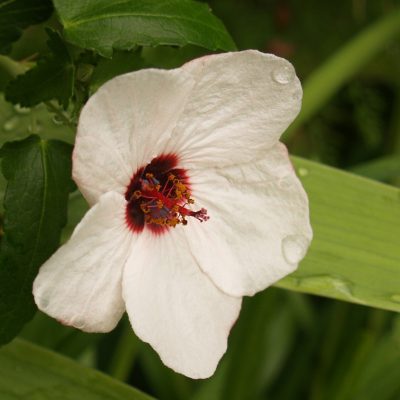Like our native pink rock rose (Pavonia lasiopetala) this species is a relative of the more tropical hibiscus, but with more drought and cold tolerance.
Plant Brazilian rock rose in full sun and give it plenty of space, since it can get up to 3 feet tall and 4 feet wide. In a bit of shade it will stay smaller, but will still flower prolifically.
The petals are pale-pink, almost white, with a deep magenta center, attracting a crowd of butterflies and hummingbirds to your garden all summer long.
As its name implies, rock rose will do just fine in rocky soils, making it a great choice for rocky Hill Country gardens, and also in xeriscaped areas of the garden with decomposed granite or other gravelly substrate.
In mild winters, Brazilian rock rose may be evergreen, but will be deciduous in colder winters. There's no need to shear to the ground in winter, but a light pruning in very early spring will encourage bushier, less leggy growth. If you have the time, lightly shearing during the growing season will also encourage more of those gorgeous little flowers.
Plant Brazilian rock rose along walkways and paths, where it will have space to spread out gracefully, and soften surrounding hardscapes.

 Helen Roberts
Helen Roberts Meredith O’Reilly
Meredith O’Reilly Daphne Richards
Daphne Richards
 Freezing and Drying Vegetables and Fruits
Freezing and Drying Vegetables and Fruits Trisha Shirey
Trisha Shirey